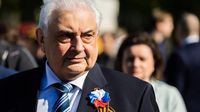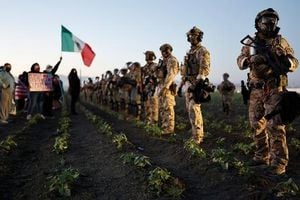Anne Will, the renowned journalist and former talk show host, has embarked on a new journey following her departure from her namesake show on ARD. Rather than stepping away from television, she has taken to the road, engaging with people across Germany to explore their concerns and perspectives on the current geopolitical climate. Her latest documentary, "Angst vor Krieg. Die Deutschen in der Zeitenwende" (Fear of War. The Germans at the Turning Point), is set to air on Das Erste at 20:15 on April 7, 2025, and it promises to delve into the anxieties surrounding war and defense readiness in Germany.
Produced by Julia Friedrichs, known for her impactful documentaries on social issues, the film seeks to combine Will's credibility with Friedrichs' storytelling prowess. The documentary features a diverse range of interviews, from ordinary citizens to high-ranking officials, capturing the essence of a nation grappling with the fear of conflict.
One of the documentary's poignant narratives centers around a 16-year-old named Theo, who aspires to join the Bundeswehr (German Armed Forces). At a recruitment camp in Kiel, Theo expresses his willingness to serve his country despite the inherent risks. His mother, while supportive, harbors fears about her son's decision, a sentiment echoed by many parents whose children are considering military service. Notably, about 11 percent of new recruits in the Bundeswehr are under 18, a record high fueled by targeted social media campaigns.
Will's exploration of this theme extends beyond individual stories; she also highlights the booming business of bunker construction in Germany. Mario Piedje, an entrepreneur, runs "Bunker Schutzraum Systeme Deutschland," which sells private bunkers to a growing clientele concerned about safety. "It’s about family," he explains, noting a notable shift in demand, particularly among women. In stark contrast, Germany's public bunker infrastructure is woefully inadequate, with only 579 public shelters available, none of which are operational.
As Will travels through Europe, she visits Lithuania, where the Bundeswehr is establishing a new brigade, the Brigade Litauen, comprised of 5,000 soldiers. Brigadegeneral Christoph Huber emphasizes the commitment to defend every inch of NATO territory amid rising tensions with Russia. The documentary paints a vivid picture of the precarious security landscape, especially in regions bordering Russia, where fears of aggression loom large.
During her journey, Will attends the Munich Security Conference, where she captures reactions from key political figures, including Defense Minister Boris Pistorius. Pistorius underscores the need for Germany to bolster its military readiness, stating, "We must prepare ourselves. I want my grandchildren to be able to say that you did everything to prevent war." He also acknowledges the troubling reality that Germany's ammunition supplies would only last for two days in the event of a conflict.
The documentary does not shy away from addressing the complex relationship between Germany and Russia. In a notable segment, Will interviews Russian Ambassador Sergej J. Netschajew in Berlin. Netschajew dismisses the idea that Germany should be fearful, claiming that the German populace is "angesteckt von einer militaristischen Psychose" (infected by a militaristic psychosis). He asserts, "Wir betrachten uns bis jetzt nicht im Kriegszustand mit ..." (We do not consider ourselves at war until now ...), leaving the audience to ponder the implications of his words.
Public sentiment regarding the threat of war is palpable, as a representative survey conducted for the documentary reveals that 56 percent of Germans express significant concern about the prospect of conflict in Europe. This anxiety is not unfounded, especially in light of recent geopolitical developments and the perceived unreliability of the United States as an ally.
As Will navigates these complex narratives, she encounters the Stanger/Salingré couple, who donated five million euros to the Bündnis Sahra Wagenknecht, hoping to foster a new peace movement in response to the increasing militarization of Europe. Their concerns reflect a broader sentiment among those who resist the notion that war is the only solution.
The documentary also highlights the stark realities faced by the Bundeswehr, including the inadequacy of its current resources. Will's conversations with military personnel reveal a consensus that Germany's defense capabilities are lacking, particularly in light of the ongoing conflict in Ukraine and the potential for further Russian aggression.
Ultimately, "Angst vor Krieg" serves as a sobering reflection on the current state of affairs in Germany and the broader European context. It challenges viewers to confront uncomfortable questions about safety, preparedness, and the future of peace in a rapidly changing world. Will's documentary is not merely a report on fear; it is an urgent call for dialogue and understanding in a time of uncertainty.
As the documentary airs, it promises to spark discussions across Germany about the balance between preparedness and the pursuit of peace. In an era where the specter of war looms large, Anne Will's exploration of these themes is both timely and essential.









